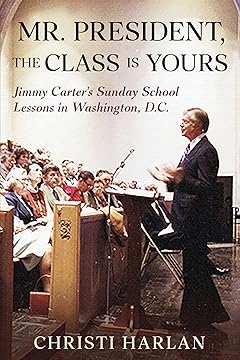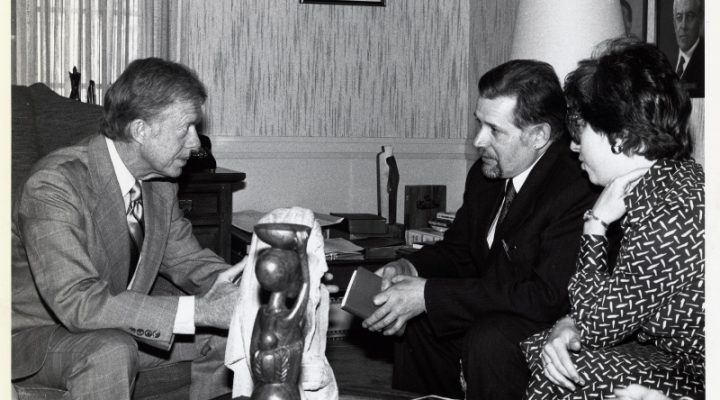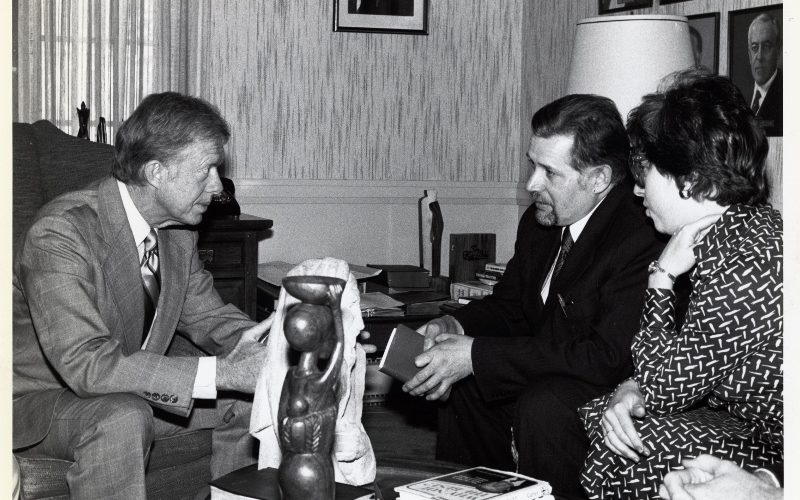Forty-five years before the Biden Administration negotiated a complicated, multinational prisoner exchange for the freedom of Wall Street Journal reporter Evan Gershkovich and 11 others, the administration of President Jimmy Carter swapped two convicted spies for five Soviet detainees.
“The dramatic and unexpected exchange took place at about 3:30 p.m. in hangar 17 of Kennedy International Airport in New York, where the five landed from Moscow on a regularly scheduled flight of Aeroflot, the Soviet national airline,” Edward Walsh of the Washington Post reported.
The freed Soviets included Georgi Vins, a Baptist pastor from Kyiv whose “crime” was refusing to affiliate with a government-endorsed organization of Baptist churches. Vins believed staunchly in the separation of church and state — a passion he shared with Carter.
When Carter took office in January 1977, he was adamant he wouldn’t worship at the White House. Three days after his inauguration, he and his family joined First Baptist Church of the City of Washington, D.C., about a mile north of the White House on 16th Street NW.
Less than 48 hours after Pastor Vins landed in the United States on April 27, 1979, he and his interpreter took a seat in the balcony of First Baptist D.C., where the church’s Couples Class met for Sunday school each week.
The teacher that Sunday was none other than President Carter, leading one of at least 17 lessons he taught at the church during his presidency. The Scripture and lesson for April 29, 1979, were prescribed by the curriculum, but the relevance was unmistakable. Carter’s lesson, “A Cry for Justice,” drew from 1 Kings 21:2-20. Even he was surprised.
“Since Georgi Vins was with me, the parallel between this lesson and his persecution in the Soviet Union was remarkable.”
“Up early to prepare my Sunday school lesson, from 1 Kings 21 — about Ahab, Jezebel and Naboth. Since Georgi Vins was with me, the parallel between this lesson and his persecution in the Soviet Union was remarkable,” Carter wrote in his White House Diary, published in 2010.
In the lesson itself — recorded by church members who were sound engineers —Carter barely mentioned the Soviet Union, which caught the attention of the Washington Post’s religion editor, the late Marjorie Hyer.
 “Soviet dissident Georgi P. Vins, newly arrived in the United States, attended President Carter’s Sunday school class yesterday and found himself likened to the just man in the day’s Old Testament lesson, who was persecuted for his faithfulness to God’s teachings,” Hyer wrote.
“Soviet dissident Georgi P. Vins, newly arrived in the United States, attended President Carter’s Sunday school class yesterday and found himself likened to the just man in the day’s Old Testament lesson, who was persecuted for his faithfulness to God’s teachings,” Hyer wrote.
“Inevitably, as the president developed the lesson, the Soviet Union was cast in the role of the ruthless biblical ruler of ancient Israel who permitted oppression and deceit to gain his ends.
“At no time did the president, who volunteers to teach the Couples’ Class at First Baptist Church every few weeks, mention the Soviet Union by name, but his repeated allusions to Vins’ willingness to suffer for his convictions made the analogy obvious.”
Actually, Carter mentioned the Soviet Union twice, but only in the introduction to his guest and the Bible lesson.
“I’ve just been told that four days ago, Pastor Vins was in a cattle car being transported within Siberia as an exile in his own country because of his belief in Christ and because of his own personal courage in expressing that belief in the strongest and most forceful way, in spite of the intense pressure and punishment placed on him and his family by the Soviet officials,” Carter said.
“There could hardly be a better lesson than what I’ve already said. Coincidentally, perhaps, or because of the works of God in some strange and mysterious way, our lesson today is precisely a lesson about our visitor — his life in the Soviet Union, his altercation with state officials, his intense courage, his punishment. And I guess it is a coincidence, but I’m not quite sure.
“April the 29th, 1979, and in our Sunday School text, the title of our subject is ‘A Cry for Justice.’ And the lesson comes from 1 Kings, the 21st chapter. And if you would open your Bibles there, we will follow along for a while discussing Ahab, Jezebel, Naboth and the prophet Elijah. And then later we will talk about the lesson that we can derive from this text as we discuss these personal verses.”
“It’s sinful to be silent in the face of injustice. And … the people of God who know Christ must represent the cause of justice on behalf of the oppressed everywhere.”
As he did frequently, Carter then directed the class’ attention to the practical application of the day’s text. “And I would particularly want you this morning not to think about the time of Ahab, not to think about even the Soviet Union, but to think about the United States, the Washington, D.C., community, and preferably, my life and your life, and our actions in the eyes of God,” he said.
Forty minutes later, President Carter brought the lesson to a close and prepared to meet one-on-one with Georgi Vins in the pastor’s study at First Baptist. Before he left the class, Carter delivered another nudge toward practicality.
“Ahab was sinful. Jezebel was sinful,” he said. “The people who stayed silent were sinful in the face of injustice — Naboth’s neighbors; the Jewish council of elders, who held a trial; those who threw the first stones, which had to be those who testified against him.
“It’s sinful to be silent in the face of injustice,” President Carter concluded. “And I would like to remind you and be reminded myself that the people of God who know Christ must represent the cause of justice on behalf of the oppressed everywhere.”
 Christi Harlan spent 20 years as a newspaper reporter, including six years with The Wall Street Journal. The excerpts from President Carter’s Sunday school lesson are from her new book, Mr. President, The Class Is Yours: President Jimmy Carter’s Sunday School Lessons, which contains transcripts and historical context of 14 of Carter’s lessons at First Baptist D.C. The paperback and ebook are available through Amazon and other booksellers.
Christi Harlan spent 20 years as a newspaper reporter, including six years with The Wall Street Journal. The excerpts from President Carter’s Sunday school lesson are from her new book, Mr. President, The Class Is Yours: President Jimmy Carter’s Sunday School Lessons, which contains transcripts and historical context of 14 of Carter’s lessons at First Baptist D.C. The paperback and ebook are available through Amazon and other booksellers.
Related articles:
New book features transcripts of Jimmy Carter’s Sunday school lessons while president
Jimmy Carter’s church to limit Sunday crowds
Carter says Baptist strife hurting evangelism


